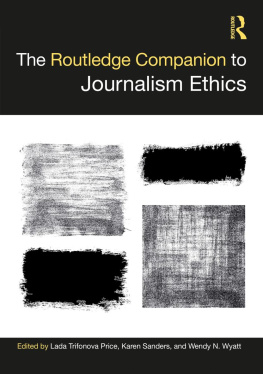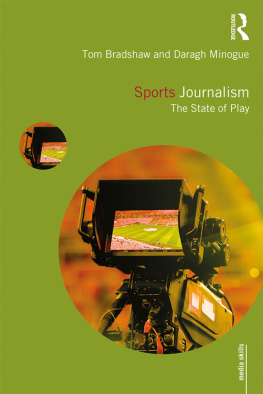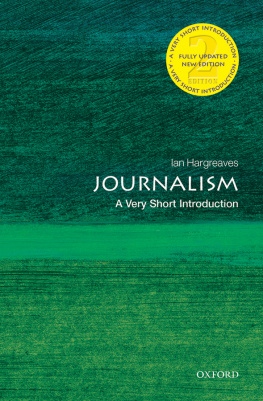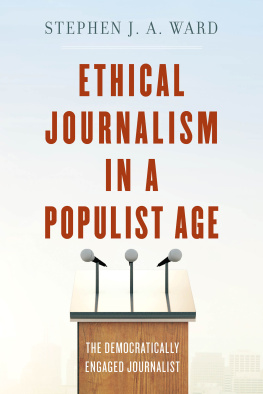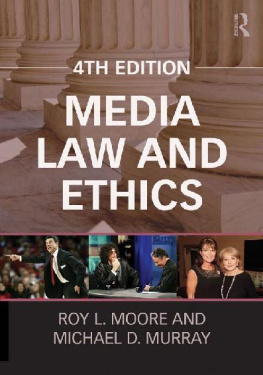Journalism Ethics
Journalism Ethics: Arguments and Cases for the Twenty-first Century explores the major ethical dilemmas facing journalists in the digital age.
Engaging with both the theory and practice of journalism ethics, this text explains the key ethical concepts and dilemmas in journalism and provides an international range of examples and case studies, considering traditional and social media from a global perspective.
Journalism Ethics offers an introductory philosophical underpinning to ethics that traces the history of the freedom of expression from the time of Greek philosophers like Aristotle, through the French and American revolutions, to the modern day.
Throughout the book, Patching and Hirst examine ethically challenging issues such as deception, trial by media, dealing with sources and privacy intrusion. They also explore the continuing ethical fault lines around accuracy, bias, fairness and objectivity, chequebook journalism, the problems of the foreign correspondent, the conflicts between ethics and the law, and the conflicts between journalists and public relations consultants.
Concluding with a step-by-step guide to ethical thinking on the job, this textbook is an invaluable resource for students of journalism, media and communication.
Roger Patching has spent more than half a century in journalism and journalism education. This is the eighth journalism text he has co-authored in the past four decades. In semi-retirement, he still teaches part time at Bond University on Queenslands Gold Coast, and his doctorate on privacy invasion is nearing completion. His contribution to journalism education has been recognised with life membership of his professional association, the Journalism Education Association of Australia.
Martin Hirst has been a journalism scholar for more than 20 years. He worked as a broadcast journalist for 20 years, including a stint in the Parliamentary Press Gallery in Canberra, Australia. He is author, co-author or editor of seven books and scores of journal articles. He is a regular commentator on media matters and currently works at Deakin University in Melbourne, Australia.
Journalism Ethics
Arguments and cases for the twenty-first century
Roger Patching and Martin Hirst
First published 2014
by Routledge
2 Park Square, Milton Park, Abingdon, Oxon, OX14 4RN
and by Routledge
711 Third Avenue, New York, NY 10017
Routledge is an imprint of the Taylor & Francis Group, an informa business
2014 Roger Patching and Martin Hirst
The right of Roger Patching and Martin Hirst to be identified as the authors of this work has been asserted in accordance with sections 77 and 78 of the Copyright, Designs and Patents Act 1988.
All rights reserved. No part of this book may be reprinted or reproduced or utilised in any form or by any electronic, mechanical, or other means, now known or hereafter invented, including photocopying and recording, or in any information storage or retrieval system, without permission in writing from the publishers.
Trademark notice: Product or corporate names may be trademarks or registered trademarks, and are used only for identification and explanation without intent to infringe.
British Library Cataloguing in Publication Data
A catalogue record for this book is available from the British Library
Library of Congress Cataloging in Publication Data
Patching, Roger, 1944
Journalism ethics : arguments and cases for the twenty-first century / Roger Patching and Martin Hirst.
pages cm
Hirsts name appears first on previous editions.
Includes bibliographical references and index.
1. Journalistic ethics. I. Hirst, Martin. II. Title.
PN4756.H545 2013
174.907-dc23 2013019549
ISBN: 978-0-415-65675-7 (hbk)
ISBN: 978-0-415-65676-4 (pbk)
ISBN: 978-1-315-86745-8 (ebk)
Typeset in Sabon
by Cenveo Publisher Services
Table
A selection of results from Roy Morgan Trusted Professions surveys 2008-2012
Figures
Caught! Match-fixer pockets 150k as he rigs the England Test at Lords,
News of the World, 29 August 2010. Copyright News Syndication
The price of truth, The Times, 23 February 2012.
Copyright The Times/News Syndication
We Dont Believe You, Herald Sun, 22 May 2012.
Copyright Herald Sun/Newspix
News of the World hacked Milly Dowlers phone during police hunt,
The Guardian, 5 July 2011. Copyright Guardian News & Media Ltd 2011 165
Steps to ethical decision-making
Thank You and Goodbye, News of the World, 10 July 2011.
Copyright News Syndication
Acknowledgements
The first two ethics texts we wrote had their genesis in the mid-1990s while we were teaching at Charles Sturt University in Bathurst, in the central west of New South Wales. We first collaborated on a training manual about law and ethics for the Australian Broadcasting Corporation in 1996-1997. Our collaboration became friendship as we wrote our first book while working in tertiary journalism progammes in southeast Queensland in the early part of the twenty-first century.
The theoretical framework, especially the development of the concept of ethical fault lines, owes much to Martins 2003 doctorate, Grey Collar Journalism: The Social Relations of News Production. His recent research has centred on the development of freedom of expression through the ages. We have each also collaborated with colleagues in various ways on other publications. Our common interest also extends to Rogers PhD work on privacy invasion, which is also a rich influence on this book.
The first three chapters explore theoretical and historical references that inform many ethical aspects of journalism, while the remaining chapters look at everyday scenarios taken from media practice. Following our usual practice, Martin drafted the initial theoretical chapters. Roger produced a draft of the preface, the case studies, and the first drafts of the practice-based chapters. The closing chapter was a joint effort.
Positive student reactions, word of mouth and emails from colleagues encouraged us to update and further explore our ethical practice research.
The last Australian text devoted entirely to journalism ethics was written by us in 2007; since then many new cases have emerged, and so have new arguments. Our examples are all new, taken from yesterdays headlines. The cut-off date for developments in ongoing stories, with only minor exceptions, was April, 2013. But ethics is never static. As many of the stories continue to evolve, further ethical dilemmas may present themselves, giving rise to more opportunities for discussion and reflection.
Keeping abreast of the ever-changing ethical landscape of the media, both nationally and internationally, involves both of us in a daily routine of reading a number of newspapers, regular listening and watching of radio and TV respectively, as well as hours spent on the internet searching various media and ethics websites. For us, based in Australia, crikey.com has drawn our attention to many potential ethical dilemmas. The ABCs Radio Nationals Media Report and ABC-TVs Media Watch are essential listening and viewing respectively. Overseas, our research has been helped by the team of the Poynter Institute in the United States (www.poynter.org) and by those who report on the media in London for


